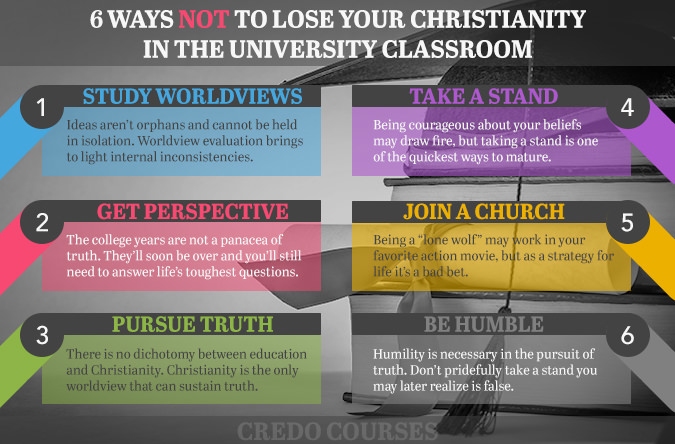
When you (or a son or daughter) go to college, will you lose your Christianity? The percentage of young people who abandon their faith while at college is debated. The numbers can be high depending on what research you look at. Ed Stetzer has written about this topic for Christianity Today. His order valium online work belies some of the hyperbole in this discussion[1]. I thank him for that.
While the numbers may not be as high as some have reported, Christians do face challenges to their faith at university. Parents don’t want their children to lose their Christianity, but they may not know what to do to prevent it.

Christians trying to remain faithful while at school may feel like they’re fighting uphill. In some respects this is just reflective of our culture, but I think there’s more to it. These battles are taking place during a liminal stage for the student. Merriam-Webster defines the word liminal this way: of, relating to, or being an intermediate state, phase, or condition[2]. From a psychological perspective, a liminal stage is one full of uncertainty and ambiguity. What better way to describe college? Can you imagine a more difficult time to try to answer life’s hardest questions?
Prepare to Lose Your Christianity
We’re concerned with how to prepare young people to handle objections to their faith. In 2009 Jim Warner Wallace (a former cold case detective) was interviewed by Lee Michaels and Jeff Shell. He said that we should present evidence to young people in much the same way you would to a jury[3]. These are young people who don’t accept the authority or credibility of the Bible. We’ve boiled down six specific steps students can take to prepare for college.
1. Study Worldviews
Life is lived in terms of “worldviews.” Ideas aren’t orphans and don’t exist in isolation. Worldview evaluation helps bring to light any internal inconsistencies one might have. First, believers should understand the Christian worldview. If they don’t understand what they believe, how can they truly have faith? Second, they should study the various non-christian worldviews. This may seem overwhelming, but it can be done. Worldviews can be grouped into categories and dealt with in bulk.
[Tweet “Life is lived in terms of “worldviews.” Ideas aren’t orphans and don’t exist in isolation. “]
2. Get Perspective
College lasts for a short time. It’s busy and often confusing. It may feel like you have to come to definite conclusions, but you don’t. Christianity has a historical pedigree that cannot be destroyed by a few college credits. College is not a panacea of truth. Once it’s over, life’s toughest questions will remain. You’ll have to answer them over and over again, even if only in your own thoughts.
[Tweet “Christianity has a historical pedigree that cannot be destroyed by a few college credits.”]
3. Pursue Truth
There is no dichotomy between education and Christianity. Christianity is the only worldview that can sustain a positive outlook on knowledge. Don’t fear truth. Truth will always lead to a deeper and more accurate faith. Believers may feel a tension between following the truth and what their faith tells them. However, the Christian worldview is lead by one who identified himself as “truth” itself. It is impossible that truth (properly understood) will lead away from God. So, pursue truth with courage in your heart and Christ in your sights.
[Tweet “There is no dichotomy between education and Christianity. Christianity is the only worldview that can sustain a positive outlook on knowledge.”]
4. Take a Stand
When I taught computer networking, I enjoyed when students asked questions or challenged me. It showed me that they were thinking. I don’t doubt some professors are authoritarian. Some may brook no dissension. That’s when courage is needed. Taking a stand for what you believe is one of the quickest ways to mature.

[Tweet “Taking a stand for what you believe is one of the quickest ways to mature.”]
5. Join a Church
Being a “lone wolf” may work in your favorite action movie, but as a strategy for life, it’s a bad bet. Christianity should be practiced in community. The members of the body of Christ help to balance each other out. Even students at a religious university can benefit from local church membership. Churches in a college town know to expect a flood of new and returning students each year. They may even have classes and programs designed around students’ busy schedules.
[Tweet “Being a “lone wolf” may work in your favorite action movie, but as a strategy for life, it’s a bad bet.”]
6. Be Humble
Humility is necessary in the pursuit of truth. This isn’t in contradiction to the fourth point above (Take a Stand). It’s the flip side of the coin. Humility and courage go hand in hand. Your beliefs and convictions may be challenged. Fellow students, professors, even the curriculum itself may make you uncomfortable. You won’t always be right. Pick your battles. Be willing to admit if you’re wrong. Refusing to give up faulty ground only makes you king of an imaginary hill.
[Tweet “Refusing to give up faulty ground only makes you king of an imaginary hill.”]
A Professor’s Perspective
Dr. Groothuis has worked for years in campus ministry. Now he’s the professor at Denver Seminary. I asked Dr. Douglas Groothuis, “How should we prepare young people for challenges to their faith in college?” This is what he said.
Video Transcript
Apologetics and Christian worldview and knowledge of the Bible should be taught in the home; and it should be taught rigorously in the church; and students going to college should be involved in classroom activity/classroom instruction to prepare them for the kind of onslaught that they’ll have to deal with, prepare them for the atheism, prepare them for the relativism, and so on.
This is very exigent because the statistics I’ve seen are pretty frightening and disheartening. So many Christians go to college and either deny their faith or put their faith on hold, and they don’t act like consistent Christians. Maybe ten years later when they have children they’ll go back to the church and get more serious. But the university and college shapes an individual decisively for life.
So Christians need to know what they believe and why as they go into these settings. So the church should have courses, study opportunities to prepare for college, parents should know what sorts of things their children should read and what kinds of seminars they should go to. And this needs to be very intentional, very serious because, otherwise, the students will very likely drift away from Christianity or become fideists and say, “I believe Christianity but it is not supported by anything I study and there’s really no evidence for it but somehow I believe it.” We don’t want that.
- Stetzer, Ed. “Dropouts and Disciples: How Many Students Are Really Leaving the Church?” Christianity Today. May 14, 2014. Accessed March 5, 2015. http://www.christianitytoday.com/edstetzer/2014/may/dropouts-and-disciples-how-many-students-are-really-leaving.html. ↩
- Merriam-Webster. Merriam-Webster’s Collegiate Dictionary. Springfield, MA: Merriam-Webster, 2003. ↩
- Wallace, Jim W. “How to Help Young People Learn to Defend the Faith.” Interview by Lee Michaels and Jeff Shell. The Cold-Case Christianity Radio Interview Podcast (audio blog), September 14, 2009. Accessed March 6, 2015. http://thepleaseconvincemeradioshowpodcast.libsyn.com/how-to-help-young-people-learn-to-defend-the-faith. ↩



[…] 6 Ways NOT to Lose Your Christianity in the University Classroom: https://www.credocourses.com/blog/2015/6-ways-not-to-lose-your-christianity-in-the-university-classro… […]
This is not fair for artists, when you click on a thumbnail it should always direct to the original page and of course have the option of viewing full size but that's it!!! Fix this now.